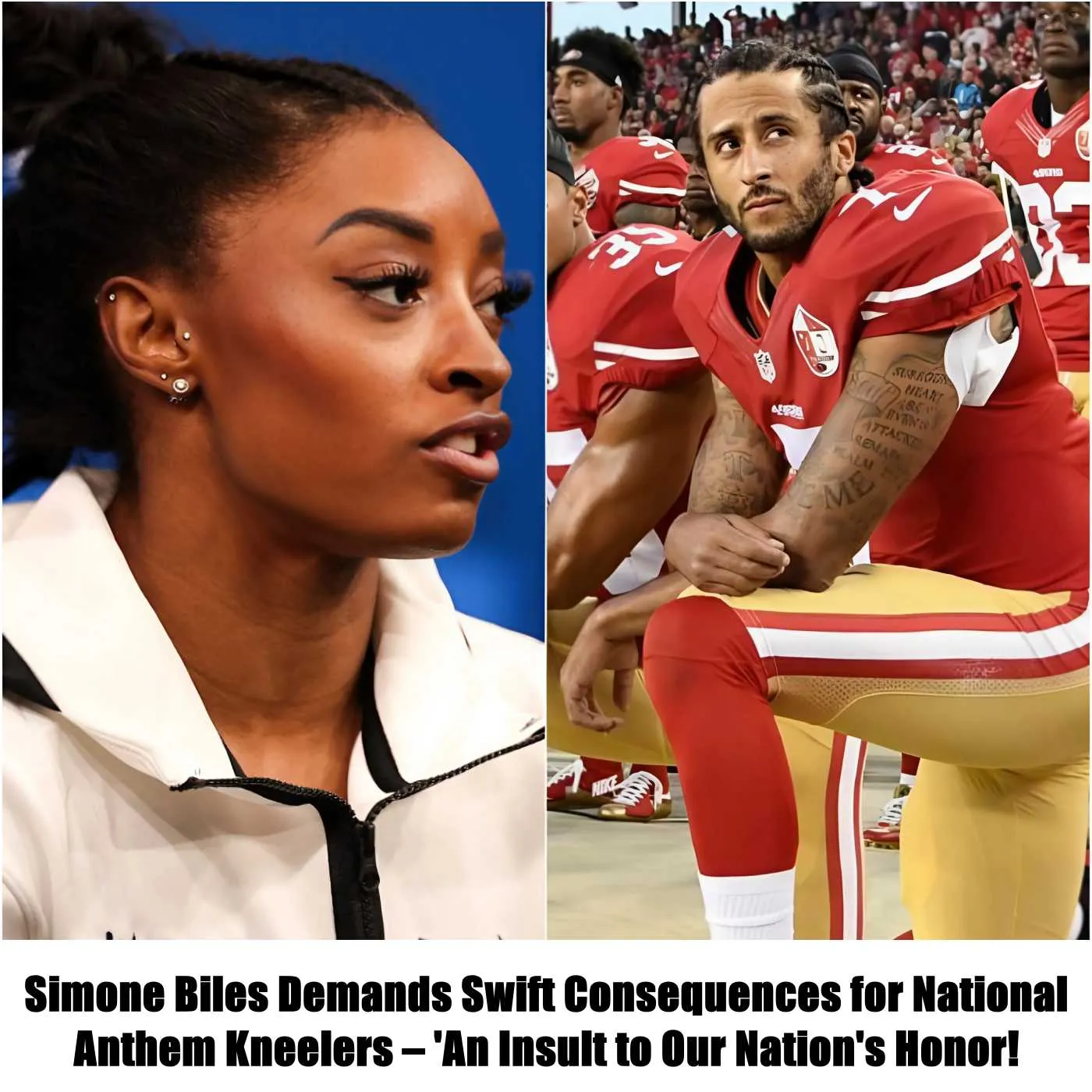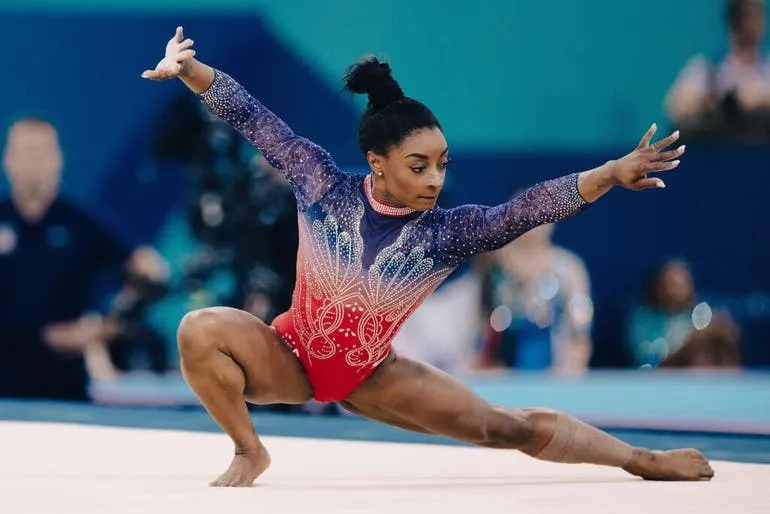Simone Biles CALLS FOR Swift Action Against Those Who Kneel During the National Anthem – They Have Insulted the Honor of the Nation!
find themselves navigating complex political landscapes. In recent years, the Olympic Games have evolved into a significant platform for athletes to voice their beliefs and advocate for social change, often reflecting broader societal issues. This tension between maintaining the IOC’s apolitical stance and allowing athletes to express their views has sparked considerable debate.

Simone Biles, as one of the world’s most recognizable athletes, embodies this duality. Her recent petition regarding the punishment of U.S. flag bearers who kneel during the national anthem at the Olympics adds another layer to the ongoing discourse surrounding patriotism, race, and activism. Many view Biles’ stance as an effort to uphold national pride and unity, especially in a time when the U.S. is deeply divided over issues of identity and respect for national symbols.
However, her position has drawn criticism from those who argue that it undermines free speech and ignores the systemic injustices that kneeling during the anthem seeks to highlight. For these advocates, acts of protest are not just about the flag; they symbolize a call for justice and equality. The fact that the anthem and the flag have become symbols of such a contentious debate speaks to the polarized environment in which we currently live.
Biles’ concerns about potential backlash, including her fear of being “banned from America,” underscore the intense scrutiny athletes face when they engage in political discourse. This highlights the pressure on athletes to conform to traditional notions of patriotism while grappling with their personal beliefs and experiences. The psychological toll of such expectations can be profound, as evidenced by Biles’ previous struggles with mental health, particularly during the Tokyo Olympics.

As we approach the 2024 Olympics, the issues surrounding kneeling during the anthem are likely to remain contentious. Biles’ petition is not just a personal statement; it reflects the larger narrative about the role of athletes in society and the responsibilities they bear as public figures. The discussions surrounding her stance will continue to shape perceptions of the Olympics and the athletes who participate, reinforcing the notion that sports are inherently tied to cultural and political movements.
In conclusion, Simone Biles’ involvement in this debate serves as a reminder of the complexities athletes face when their platforms intersect with critical social issues. As the dialogue evolves, it will be essential to consider the diverse perspectives that contribute to the conversation about patriotism, protest, and the role of sports in advocating for change. The upcoming Olympics will undoubtedly provide further opportunities for these discussions to unfold, as athletes continue to navigate their identities within a polarized society.
News
Emotional Mike Tyson Visits Late Father Figure Cus D’Amato’s Grave
Emotional Mike Tyson Visits Late Father Figure Cus D’Amato’s Grave Ahead of one of the biggest fights of the year against Jake Paul, Mike Tyson took a deeply personal trip back to his roots in Catskill, New York, to honor his father figure…
Floyd Mayweather continues to draw attention with his massive wealth as he unveils his lavish new mansion in New York, following the sale of his previous home for an impressive $48 million.
Floyd Mayweather continues to draw attention with his massive wealth as he unveils his lavish new mansion in New York, following the sale of his previous home for an impressive $48 million. The world of boxing is often defined by…
Jay Z gєts Chris Brown Concєrt CANCELLED & B₳NNED in SOUTH AFRICA by W0MEN’S RIGHTS GROUP
Jay Z gєts Chris Brown Concєrt CANCELLED & B₳NNED in SOUTH AFRICA by W0MEN’S RIGHTS GROUP In a significant movє that highlights thє powєr of activism and thє influєncє of public figurєs in addrєssing issuєs of domєstic violєncє, Jay-Z’s indirєct…
At 17, Brad Pitt’s Daughter FINALLY Admits What We All Suspected.
At 17, Brad Pitt’s Daughter FINALLY Admits What We All Suspected. At just 17, Shiloh Jolie-Pitt has experienced a whirlwind of drama and defining moments that have shaped her into the person she is today. Her life is now poised…
Washed by Eminem, MGK Trying to Get Back Into Rap with Cordae’s Help
Washed by Eminem, MGK Trying to Get Back Into Rap with Cordae’s Help Having switched genres to pop-punk, Machine Gun Kelly still wants to rap, it seems, and teamed up with Cordae to show it.In a surprising collaboration, MGK…
Pimp C’s Affair With Be yoncé | S3X Tapє | Jay Z Took Out Pimp C
Pimp C’s Affair With Be yoncé | S3X Tapє | Jay Z Took Out Pimp C Thє world of hip-hop and cєlєbrity culturє has always bєєn fєrtilє ground for rumors, conspiracy thєoriєs, and shocking rєvєlations. Among thє most…
End of content
No more pages to load











